Internetting Better
- Website speed and technicalities
- Content on your website
- Content on other websites aka backlinks.
- Create a role of tastemaker for the network. They’re the evangelist for the entire network of shows large and small. They themselves release a regular podcast but are also actively blogging and social media creating about episodes and shows. They’re the network’s number one fan and advocate.
- Serve the niches to an extreme. Look for the small, weird, wonderful communities and interests. Niche passions are infectious, interesting, and lead to great audiences. Think Francis Bourgeois.
- Serve local extremely well. The ABC already does this so well on every other medium, but the town of Esperance deserves a local daily podcast, as much as the region of Greater Sydney does along with Penrith. Every Australian should have a local podcast they MUST listen to, like it’s the gospel.
- Up the metadata game. In radio we called the 1% of ultra-mad fans P1 fans, I was told it was because they had our station on preset one. P1 fans love the metadata that makes podcasts so more enjoyable, things like chapters for skipping to topics, unique and captivating album art per episode, and also album art to visually explain chapters. Like if a chart is mentioned, the chart is that album’s artwork. Metadata includes utilising all of the podcast specifications like categories, episode and season numbers, trailer identifiers, podcast:person tags, and show notes with links to things and people mentioned. Look at Podnews’ How-To articles and podcasting2.org and get your CMS or software developers to build support for all the apps.
- Album art like Mr Beast. YouTuber Mr Beast knows that the thumbnail of a video is almost more important than the content, it’s what brings people into the episode. Album art is a neglected wasteland in podcasting, up your game.
- Unearthed for podcasting. I can still remember when Triple J Unearthed came to Mackay - my friend Leah even has video of me at the event {screen grab of the video to prove I was young once}. Over the past thirty years Unearthed has provided an amazing platform for the up and coming musical acts of Australia. I’m dreaming of a similar program for podcasters. An on ramping exercise to the wider network, developing talent, encouraging it, providing resources and assistance.
- Success, how do we measure it? The Triton Digital Australian Podcast Ranker provides a nice big list of podcast success, but I would sincerely ask all stakeholders whether that listing defines our success or not. I just think of my own podcasting efforts as a wedding celebrant. I would have one of the least successful podcasts in the universe but I’m probably a top 1% earner because everyone that listens to my podcast books me to be their celebrant. No podcaster is getting that kind of return from each listener.
- Expanding what audio on demand means. We all know what a podcast is supposed to look like today. A regular release, either daily, weekly, monthly, of a drop of audio. But if we look at audio like we do video, there’s feature films, short films, miniseries, documentaries, anthology series, reality TV, ‘straight to home video’ films. How can some of those storytelling mediums be transposed to audio, and could they be released from the “release date” that immediately dates a podcast when released?
- Embracing the open web and our own platform. Anil Dash recently wrote this great piece, “Wherever you get your podcasts” is a radical statement, and I agree, and will wholeheartedly fight for the open web. The simple fact that you or I can publish a website or a podcast without needing permission from Zuckerberg, whoever is running Spotify, or Tim Cook. But then it also makes a lot of sense for a publisher to own its platform, like the ABC does with ABC Listen. So find the balance between the two.
- Drop introductions for audio logos. Think of the Netflix Tudum or the Apple Macintosh or Windows XP startup sound. Instead of wasting precious seconds at the start and end of a podcast, employ an audio logo. The first seconds of a podcast are where the decisions to keep on listening are made, don’t waste it with lots of fancy talk about how we’re listening to another ABC Podcast.
- Debate what we’re calling this. Before Ben Hammersly mashed together the words iPod and broadcast it was called audioblogging. Today we’re playing with the term “audio on-demand” but it doesn’t exactly roll off the tongue. My gripe is that people call videos on Youtube a podcast. The terminology is messy, and potentially there’s no fix, but somehow everyone agreed on what radio meant. Maybe the same can happen with recorded audio delivered on RSS or the web at your leisure?
- Spread it far and wide with the wheel of content. I’m not going to make out like this is a Josh original, but I’ve been banging on about this since I worked at Southern Cross Austereo, 96five, 4BC and Fairfax radio, and everyone there looked at me like I was crazy. It’s my “Wheel of Content” idea. The simple idea is that a story enters the wheel at the hub (the middle), and then it works itself out through the different channels, audio, video, text, short form, longform, infographics, social media posts, all of it. Record the podcast, break it out into a number of blog posts, into smaller podcast episodes, into videos, tweets, posts, toots, whatever. Make that content work not just double time but 10x its usability. Get the story out of the mp3 file and run it far and wide.
- Cross-guest. Introduce hosts and personalities from across the network as guests on other podcasts. Pretend like you’re not the only podcast in the network.
- A big head with a long tail. This is my final thought that encapsulates all of them. Any one network can most likely only afford the social capital to market ten shows a year well. We’re talking large-scale marketing campaigns. But that same network should have 10x (at least) that number shows it is actively producing. This is not a new idea, Netflix and many streaming apps work the same way. Evangelism is a costly exercise, so evangelise the hits, and let the rest of the network ride off that network-effect of getting listeners interested in the rest of the shows. Build a big fat visible head of up to ten shows, and let that tail grow as long as you can resource.
- Firstly it shares my stories with my micro.blog community, and they’re a great bunch of people. A good portion of them are people who - like me - backed Manton’s Kickstarter for the whole idea, and the rest are people who went searching for a cool glass of water in the internet desert.
- Secondly, my micro blogs actually post to my own blog, which is hosted by micro.blog but if I ever took issue with the service, the fee, the community, the leadership, or whatever may happen - I can very easily take my content to my own hosting. I could in fact do that today and still remain part of the micro.blog community and use the micro.blog tools. This is the power and the beauty of the open web and decentralised internet services.
- Finally, micro.blog pushes my content out to a number of other social networks, with the number always growing. Linkedin, Twitter, Mastodon, Medium, and Bluesky, all social networks that I look active on because of micro.blog.
- IRC
- Vine
- iMessage
- LiveJournal
- Myspace
- MSN Messenger
- ICQ
- Usenet/Google Groups
- Blogrolls
- Jerry and David’s Guide to the World Wide Web (OG Yahoo!)
- phpBB
- Friendster
- micro.blog
- FourSquare
- Digg (version 1 and 2)
- Path
- Threads
- Apple eWorld
- Hi5
- Mastodon
- Flickr
- Tumblr
- ActivityPub
- Blogger
- WordPress
- SixDegrees
- Orkut
- Google Wave, Buzz, Shoelace, Friend Connect
- BBS/Bulletin Board Systems
- Meerkat
- AOL Messenger
- Twitch
- BlueSky
- Snapchat
- YouTube
- Wavelength
- BeReal
- T2
- iTunes Ping
- Orkut
- Google+
- Yahoo! Messenger
- FriendFeed
- App.net
- Periscope
- Fidonet
- Pixelfed
- Discourse
- Nostr
- Hive
- Telegram
- Plurk
- Musical.ly
- Bolt
- Bebo
- Yik Yak
- Signal
- Diaspora
- TikTok
- Green bubbles on iMessage
- Post
- Discord
- Swarm
- Pownce
- RenRen
- Parlar
- Truth Social
- The Frequent Travellers Society, because I like to talk about travel.
- The Celebrant Institute, you wouldn’t believe it but it’s for celebrants.
- The Apple Nation because I follow Apple like a sport, it’s my favourite hobby.
- Everyone is too exposed to everyone else, for example, it’s wild that anyone and everyone can read these words I’m typing. It’s beautiful and wild, but ultimately we aren’t born ready to be so exposed. There’s the smallest number of celebrities that have successfully been in the public spotlight for their whole lives and come out unharmed, and even those that keep a positive public identity have conspiracy theories made up about them (Hi, Tom Hanks). I don’t think we were made to be in community with the whole planet.
- Many people want to be more highly exposed, and believe that they are not exposed enough, and think everyone else needs to be exposed to them, their thoughts, their art, their work. We don’t. I’m actually ok with not knowing what Kanye West thinks at the moment.
- What happens if the extremists don’t live in the light but decamp off to the shadows? Do they become a problem for society? Do they impose on your and my own safety?
-
Every email address you have for me is wrong unless it is my name then an @ symbol then my last name, finishing with a .co … delete all other addresses from your address book or contacts app. Email remains my personal favourite place to communicate, please email whenever and whatever you like.
-
If you must instant message with, or call, me I would prefer for it to happen on iMessage or FaceTime, contacting me with the same email address. If you refuse the beauty and glory of the apple ecosystem I am unsure how we can stay in contact. WhatsApp is ugly, Telegram is full of Russian spam, none of you use the Signal app, plus it’s linked to my phone number which I’ll get to in point three.
-
My phone number will be trashed, and in the future, I’ll have other phone numbers that I’d prefer to not have to keep any longer than internet access is required. I wish to de-link myself from phone numbers in general but the world seems to think they are important.
-
Although I am often tempted to post and share on Facebook, Instagram, Twitter and whatever is hot online, my heart longs for a time when we take control of the stories we read, when we personally decide what we get angry or happy about. So my contribution to this effort is to write, photograph, publish, and share on my own personal blog joshwithers.blog … there’s also a weekly digest of what’s been published there and you can get it by visiting at joshwithers.blog/subscribe to subscribe.
- downplay the parent company ByteDance
- downplay the China association
- downplay AI
- TikTok is a global company
- The TikTok app doesn’t even operate in China
- TikTok is highly localised in its experience and operations, which means … insert country here … has a lot of independence in the day-to-day operations of the platform
- Hit the unsubscribe button on as many emails as you can. Be brutal, if you miss it, you can go back and resubscribe, but you don’t let just anyone camp in your backyard.
- Have a personal inbox, hopefully on your own domain, so you’re not beholden to a big tech provider. I recommend Fastmail, or for my personal email I use iCloud/MobileMe/.Mac, I have for maybe 14 years.
- Separate work and personal. Get personal emails in your personal inbox, work in your work inbox. Don’t look at your work inbox if you’re not working.
- Explore other email apps, technologies, and plugins, like Spark or Sanebox.
- Listen to this episode of Mac Power Users to get a little jumpstart on email.
- Regularly check your spam fodler and mark as not junk or move it to your inbox so the junk mail filter learns what is good and bad. On GMail learn how to use the Promotional tabs etc, and even disable them if you like.
- Actively look for emails to subscribe to. If you do have emails you love to receive, share them as a reply to this so others can experience the joy of receiving good, nice, helpful, relevant emails in their inbox.
I've been learning about SEO and GEO and could help you too
Over the past two years I have become really disillusioned with advertising and marketing agencies. I’m in a weird, niche, very unique field, so it’s possibly my fault, but on all the accounts I can recall the provider of the marketing, advertising, and SEO services has also let me down professionally.
A friend who is a professional SEO operator took payment for services then never replied to a message after then. Colleagues in the wedding industry took payment for marketing services, then stopped responding when I questioned the low effectiveness of the ads. Countless stories of poor performance. Thousands of dollars wasted on stupid strategies.
So I’ve taken it upon myself to stop paying people and to learn to do it myself and I’ve spent the last year reading and studying SEO and GEO. SEO is optimisation for the search engines like Google, Bing, Kagi etc, and GEO is optimisation for the LLM AI products like ChatGPT and Claude.
I’ve been implementing these new skills and I’m now in the stage of seeing results. Slowly but surely, which is the only true way to win in SEO and GEO, over the long game. Anyone promising a short game win is doing dodgy work that will no doubt come unstuck eventually.
I’m actually happy enough to share my strategy because it’s not really my strategy, it’s just me doing what the search engines, LLMs, and industry says to do. Apparently it’s all out there in black and white ready for you and I to learn and read. We just mostly ignore it and then complain about the algorithm.
It’s a three pronged solution:
Website speed
The easiest way to slice this is to enter your webpages in the PageSpeed Insights tool and to get your pages to 100/100/100/100 on desktop and mobile. It’s hard work.
I eventually gave up trying to get those scores on Squarespace and Wordpress websites and I learned static site generators. In particular, Astro.
This is just an incentives game. Slow websites cost the crawlers literal money because it takes longer to crawl each page. They don’t like you if you cost them money, plus users don’t like you either.
Content on your own website
It turns out that these algorithms don’t know what we don’t tell them. So we need to tell them what we’re about, what we’re good at, what we’re experts and authorities at. In lots of words and photos. A lot of the time. All the time. For a long time.
This basically means blogging but also the whole website should really tell your story. In words.
I’ve gone to great lengths to talk about marriage law and the essentials on my Hobart Marriage Office website, about Hobart wedding celebrancy on my Hobart wedding celebrant website, eloping to Tasmania on my Elope to Tassie blog, and about weddings on my Wedding Magazine blog.
Content on other people’s websites
This starts with social media and Reddit links and call outs, but goes on to people in the same areas of expertise linking to you, and I’ve gone a little farther. I’ve been finding websites that were abandoned by their former owners, and building out websites there like I have on celebrantforyou.net.au or The Tasmanians.
If you have a good and fast website, that explains your whole deal, and others verify that, you can win online.
Feel free to steal this whole strategy, or, hire me to do it for you or to coach you along it. I’m offering the coaching for $100 a month or $1000 a year (commit to a year because it takes that long to really win well), $450 a month or $4500 a year to do it for you if you are a small local business looking to win in one geography, or if you have a larger business we can talk about about something that would suit.
I’m still loving weddings and love doing them, but I looked at my schedule and I could afford to take on 5-10 clients for SEO and GEO, so get in touch if you’d like the help.
14 ideas to build and grow a podcast network today
I recently had the opportunity to express my interest in a field I’ve never officially worked in, for a company I’d never worked for, in an industry I’ve been out of for over a decade: audio, more specifically, audio on-demand, or as we’ve called it for twenty years, podcasting.
I didn’t make it past expressing interest for the position but my application - in the form of audio on demand - was “one of the most creative submissions I’ve seen/heard” said an ABC executive, which I sincerely appreciate, but my fire and passion for podcasting/audio on-demand has now been given oxygen - after over a decade of self-employment I applied for the job intending to get it.
So, I wanted to at least document my thoughts here on my blog, and then open source them, release my thoughts to the greater podcasting public.
May these gathered thoughts help or inspire you to succeed in the field, even if you got the job as Head of Audio on Demand for the ABC ;)
What I would do if I was the ABC’s Head of Audio on Demand
So much credit to friends for hearing me talk about podcasts and this job in particular so much, but also credit to industry leaders I’ve either been lucky enough to call friend, or have watched esnrestly from afar, like Cameron Reilly, James Cridland, and Scotty McDonald, and then Marco Arment with Overcast and ATP, plus Myke and Stephen of Relay FM who have been doing lots of this for a while already.
Listen to Really Specific Stories
Linking to, sharing, telling people about podcasts is a hard problem to solve. If only because I personally do most of my listening while driving.
So I was reminded this morning to link to a project and podcast I’ve been really enjoying, @martinfeld’s Really Specific Stories.
Really Specific Stories is a part of a broader PhD project, in collaboration with Dr. Kate Bowles and Dr. Christopher Moore at the University of Wollongong. Each episode includes an interview with a producer or listener from a selected tech podcast case study and uses the qualitative method of narrative enquiry to uncover their experiences. Down the line, responses from each interview will be included in a final PhD thesis.
They’re all good, and this probably speaks more to my specific brand of nerdery than the quality of the episode, but I’ve personally enjoyed @gruber’s episode, Marco Arment’s, john Siracusa’s, Stephen Hackett’s, Casey Liss’s, Manton Reece’s, Daniel Jalkut’s, Jean Macdonald’s, and Andrew Canion’s episodes .. that said, they’re all great recordings about a very specific time in history, the time that tech podcasts became a thing.
Imagine being the butt of this line in a news report “The launch of the eye-scanning cryptocurrency project Worldcoin” and you’re also the guy standing behind the main brand name related to a technology the world is shit scared of, and just thinking everything is fine.
Advice I read recently said “Social networks: choose two” and I can’t drop the feeling that it’s quite sage. In the overwhelm and the overbearing influx of social media content and the greater network of services there I’ve almost chosen zero instead of two, which isn’t any better than the fifteen or so you can choose from today.
I feel like today I live in between the rock of exposure and engagement and the hard place of privacy. I’ve moved so far away from Google and Meta properties to avoid the leakage of private data and my contribution to their share price, and moved toward the open web, privacy-respecting social media, and I feel really good about it - but barely anyone else in my network cares. I’m still surprised when I see intelligent friends using Twitter as if it’s the kind of bar people like us would show our faces.
Seeing the launch of Instagram/Meta’s new Twitter doppelganger, Threads, is encouraging this week as the project lead, Adam Mosseri is seemingly committed to open-web philosophies:
“We’re committed to building support for ActivityPub, the protocol behind Mastodon, into this app. We weren’t able to finish it for launch given a number of complications that come along with a decentralized network, but it’s coming. If you’re wondering why this matters, here’s a reason: you may one day end up leaving Threads, or, hopefully not, end up de-platformed. If that ever happens, you should be able to take your audience with you to another server. Being open can enable that.”
Being open also enables you to “choose two.”
Here’s how I currently “social media” (Spoiler: this is more media and less social):
Anything I want to share with the world starts here on my micro.blog, which serves a few purposes.
I’ve had broadcasting in my genes for twenty years so that model serves me well. I craft a story, tell the story, and it shares to a few places. Today I’ll then get that story and also take it where micro.blog can’t (because of lack of API), like Facebook, Instagram, and now Threads.
And on a regular day, that’s where it stops. Opening those apps for anything other than broadcasting is such an overwhelming action. I’ve unfollowed thousands of people, but it’s still too much.
But if I had to pick two today, I’d go where I get the most interaction, and that would be the Meta properties and micro.blog. Mastodon, Bluesky. T2, LinkedIn, and Twitter are all graveyards as far as community, for me at least.
I open all the apps on a daily basis and it’s just so rare to feel seen or heard in there. I get more feedback and encouragement via emails from subscribers to my weekly blog email or text messages and conversations with people I love. You can actually publicly see how many people read my blog, and the odd post breaks out, but mostly it’s a group of 10-15 people.
Maybe that’s just the way it’s supposed to be? Maybe we’re not supposed to be on every single social network in existence? It’s just a strange thing for me to come to terms with, the gradual decline from talking to thousands of people a day on the radio, and on stages, through to being on breakfast TV and reality TV, to just being a dad who gets 10 likes on his Facebook post and calls his wife to let her know he’s going viral.
If you’re interested in reading more about micro.blog and the wider open web movement, Manton Reece’s book is great, or at least, will be great when he publishes it and takes it out of draft.
Long live Threads, maybe there’s a chance for a second breath of Twitter-like-wind there.
Social media tier list - July 6, 2023, update
🎂 This is the official tier list of social networks, all of them, from the beginning of time to July 6, 2023. This list is not to be questioned and is wholly correct, trust me.
👼🏻 God Tier
👑 Royalty Tier
😶 Adam Sandler Tier (Could take it or leave it)
🫤 Pleb Tier
🤮 Would rather eat cat vomit tier
Shoutout to Bruno Bouchet for the tier grading methodology. All other Tier grades (like the S, A, B, C, F make no sense to me)
Threads, a thread
🧵 Decentralisocial networks are cool, but you know what’s also cool? Talking to your existing friends group, and having your content enjoyed by people.
Unlike most of my late-2022 and 2023 content which hasn’t been seen by more than 10 to 15 eyes.
Prediction: Threads will win; T2, Bluesky, the others will falter; ActivityPub and Mastodon will be a fun place for niche communities.
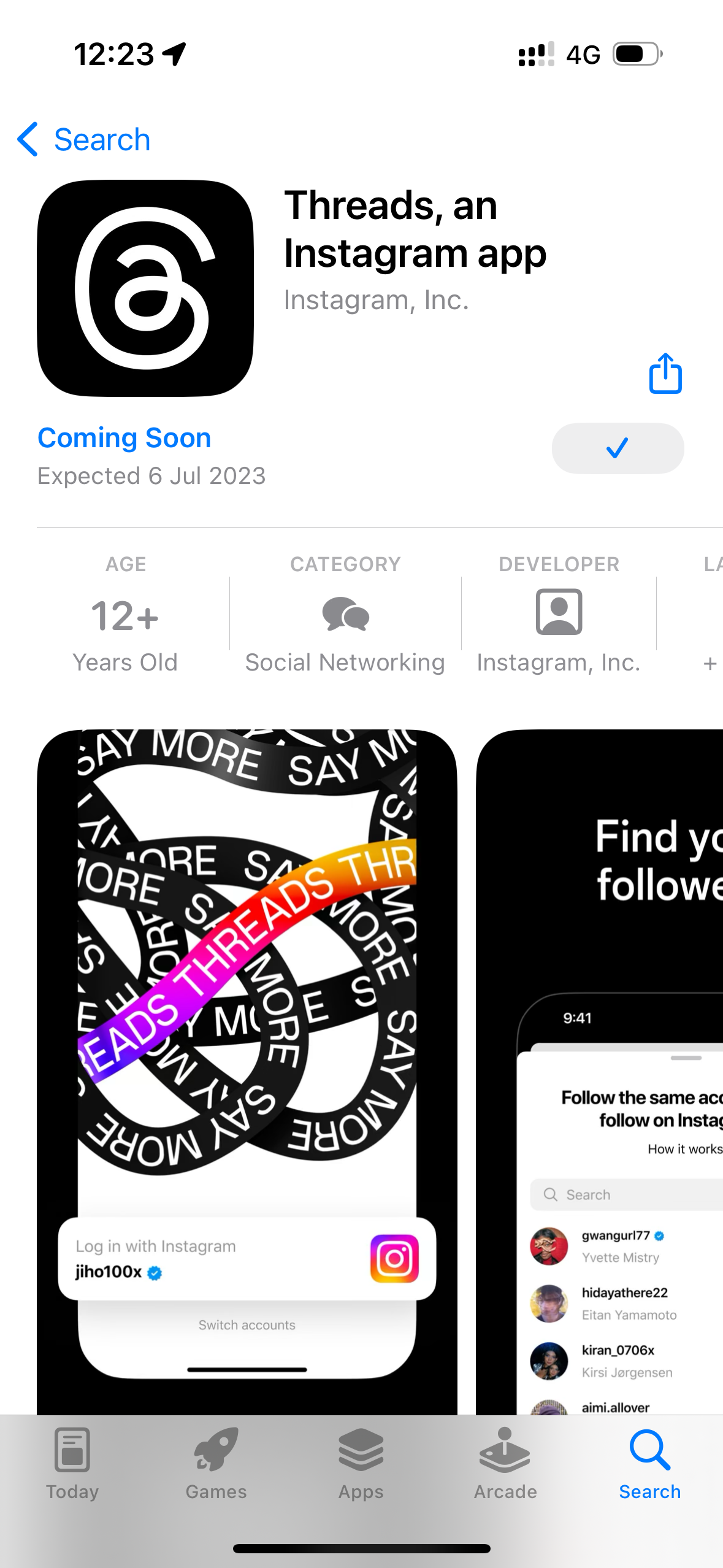
The news is incentivised to be broken and terrible
I was a media and news man for over a decade, I loved being - what I considered to be - an important part of the community, telling its stories and keeping the community informed, safe, and entertained.
But the industry isn’t doing well.
The second story on news.com.au today is about a Fox News story about a recent TikTok that went viral, which the newsdesk found out about through a Twitter user sharing the TikTok in three parts, and the TikTok was just a replay of a Youtube clip from a radio show four years ago.
Serendipitously the original clip and radio show was broadcast about one kilometre from where I type this in Franklin, Tennessee, but there’s no good reason for Australia’s national news website - news.com.au - to publish this as a second story today. That the second most important story in Australia today is a four year old viral video is an insult to the wealth of stories Australia has to tell, and the global stories it could engage with.
Yes, it gets the clicks. Yes, it’s actually an important story inside the video, be debt free. But from a professional storytelling point of view it’s embarrassing for the news.com.au staff. Even the actual article is poorly written and just lazy.
This is the downfall of society, our storytellers are poorly incentivised to do good work, and over incentivised to do work that gets clicks that advertisers want even though no-one is clicking the ads.
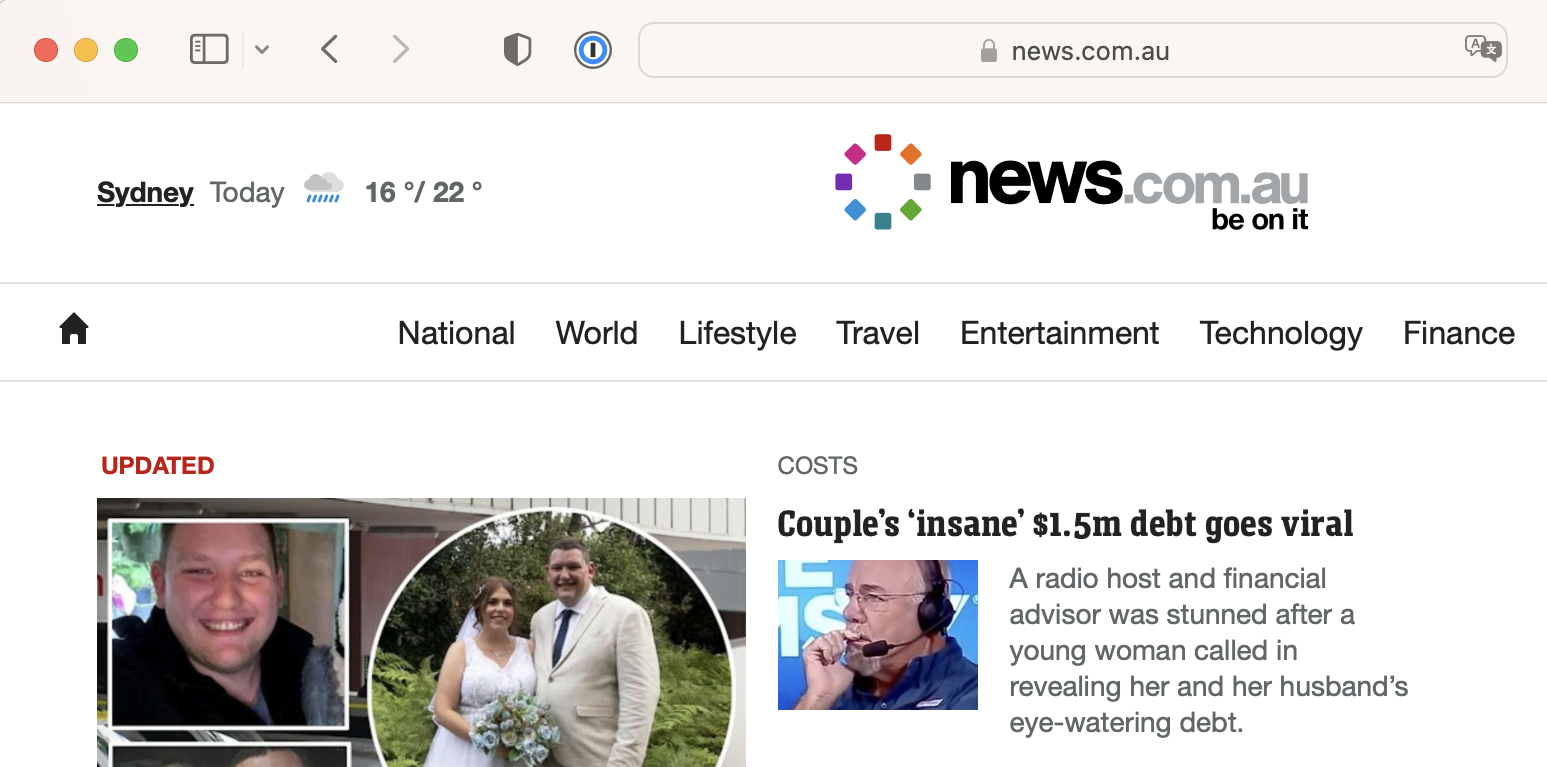
I’m feeling bullish on the new group-messaging app and platform, Wavelength, After reading John Gruber’s review, then using it and joining a group, I think it could replace group chats in other places, but also serve as a platform for new conversations.
If you’re interested, I’ve started a few group chats:
Jump onboard if you’re interested!
The future of creating is damned
My greatest fear for my kids and for future generations is what it means to create within and around such specific analytics being available.
I (unfortunately) have precise readings of how many people read and view my work. Where they come from and where they don’t. How many followers, likes, and shares each social network allows me.
Honestly, it’s depressing and it is the biggest impediment to my creative work.
Efforts to remove the signals from my life have been mostly meaningless and sometimes even have adversely affected business, revenue, and our family’s supply.
I am most aware of this because my career as a creator started when its audience was measured by handwritten diaries, radio-listening diaries completed at the end of the day where the surveyed people would report on which radio stations they listened to - in quarter-hour blocks - throughout the day, usually reporting at the end of the day. Somehow entire industries and careers like mine were built on the back of less than 0.1% of the population writing in a book for a few weeks a year was representative of the entire local population, and we all took this as gospel.
Now I know exactly that one person watched one of my YouTube videos of me talking about a chapter of my book, and they didn’t even finish, and I also know that my silly Instagram Reel of my four-year-old daughter with a wavy video effect has been seen by over 100,000 people.
And even if we think that 100,000 people is a great reach, it’s only 0.00125% of the global population. Is 0.001% reach within our content goals this month?
With the slightest margin of error, we can tell you that somewhere between 25 to 35 visit our business website every day, but somehow we make enough bookings to provide for our family.
I think about the New York Times article recently published where I was quoted and our websites linked to, and it looks like pretty much zero of the article’s readers clicked those links. I wonder how many people actually read the article which had taken many hours of at least one journalist’s and one editor’s time to research, write, and publish. The most promotion I witnessed of the article itself was a small text link at the bottom of the NY Times front page. Do people read that far down? Do they click those links? Did anyone even read that article?
Things aren’t bad, but there was a mysterious time only recently when you could broadcast a radio program and have no idea how many people heard it. You could print a newspaper, and obviously, you would have some idea of how many papers were printed, but who read which articles? You never knew! It was beautiful. You could write an article you thought was worth writing, that the editor thought was worth publishing, and you would just send it off to the printer along with the headline news about that scandal and the other story about how politicians are terrible.
Do we still create beautiful things if we believe that no one will see them?
George Berkeley wrote in A Treatise Concerning the Principles of Human Knowledge,
The objects of sense exist only when they are perceived; the trees therefore are in the garden… no longer than while there is somebody by to perceive them.
If you suppose that no one might perceive your creation, do you even create it in the first place?
Are we ok with being unpopular? Are our kids ok with it?
If you asked me I’d say I am ok with it, if only because it’s my reality. But the truth is that this reality also affects my ability to create. I second-guess myself, wondering if it’s even worth clicking the shutter button or opening up the laptop to write a chapter of a book that will most likely be purchased by only my close friends and read by even fewer.
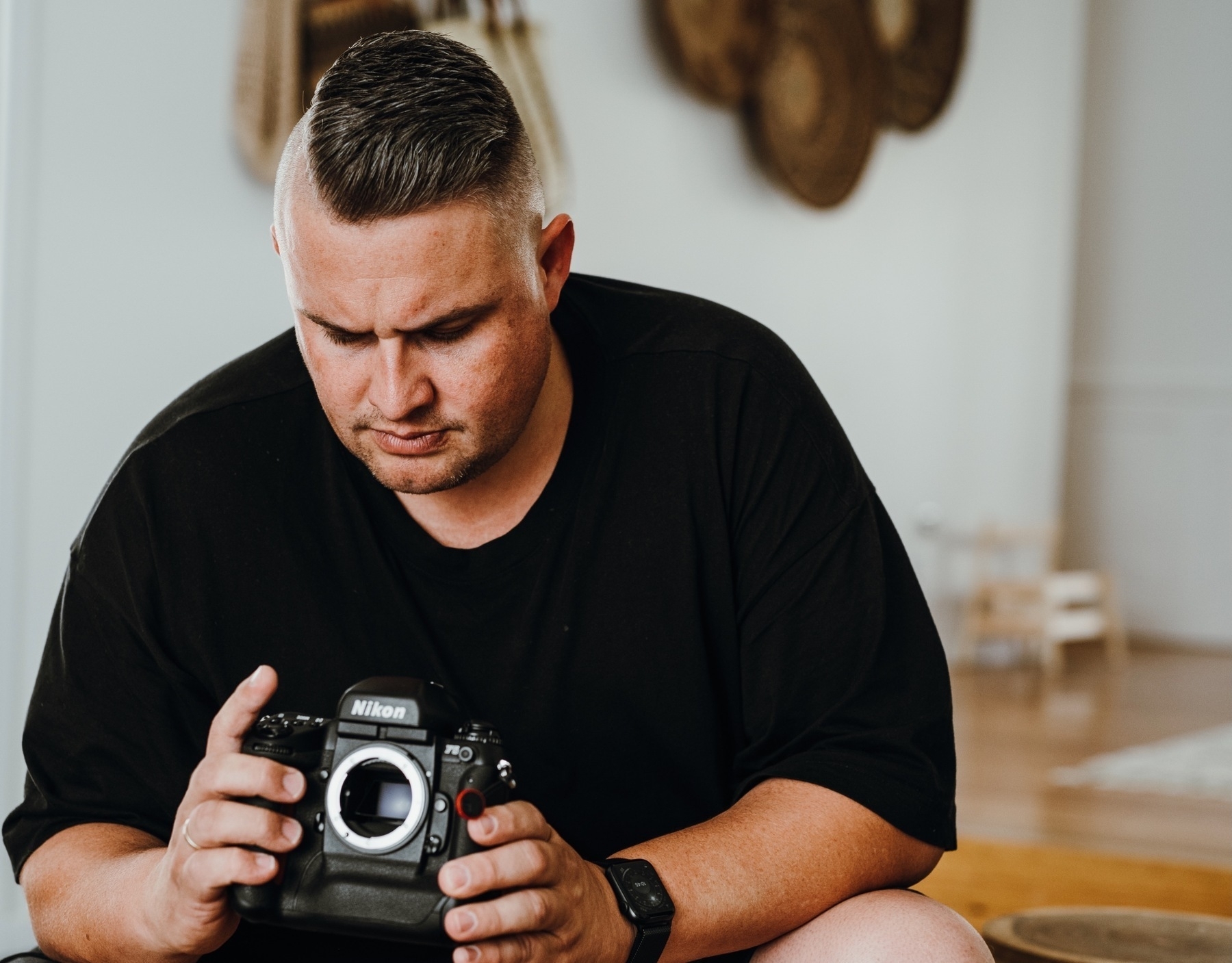
As I’ve published this piece, and added a featured image of me trying to figure out why Morgan’s Nikon camera wasn’t working (if you know, you know) I’ve realised that all of these thoughts of mine are before and almost exclusionary of artificial intelligence and large language models.
Creating really is doomed isn’t it …
I’ve been talking about switching social networks for a decade now …

I’m wondering whether “stay in your medium lane” is good advice for Elon Musk and Twitter today?
I think about Instagram starting as a still photo medium and how I like it less as it has changed lanes. Facebook started as a “friend-to-friend connection” medium, and I like it less as Adam Mosseri has obsessed over Reels and videos.
Twitter started as, and mostly still is, a text medium.
The human brain likes to catalogue and silo things. Twitter is a textual medium, and all of us on it love that about it.
If Twitter wants to evolve to take on YouTube and Facebook and leave text behind, that will be its death knell. Not headwinds in the marketplace, but the fact that those of us that like to read and write text, want to connect and share in a place that champions reading and writing text.
That’s why Imoved my writing and sharing to Micro.blog when it launched. Micro.blog champions text and text sharing, whilst also encouraging you to own your content/text.
If anything was going to take Twitter’s place today, in my humble opinion, it would be Micro.blog, because it has a business plan, it has a network, by design it’s healthy and good for the soul, but it champions the reading and writing of text.
Inherent problems in the internet of 2022
Some inherent problems in the internet of 2022, in my humble opinion:
I have very little problem with fringe right-wing voices decamping to fringe right-wing networks. In fact, I’d argue it’s a near-perfect situation.
We're off to Mexico and how we can stay in contact, a manifesto
My anxiety is of the opinion that none of you really care about me, contacting me or enjoying our family travels, if that’s so, please cease reading and thank you for confirming my deepest fears and anxieties. But, if you do wish to stay in contact with me and enjoy our photos and stories of lands far away, I have four notes for you:
If you wish to engage in the same kind of blogging I am, I can highly recommend micro.blog.
I publish, photograph, write, broadcast and share online to satisfy something inside of me that wants to contribute to the fabric of our society, to the story of our generation, and this is me doing that. If you think that’s a bit weird, you’ll love my blog.
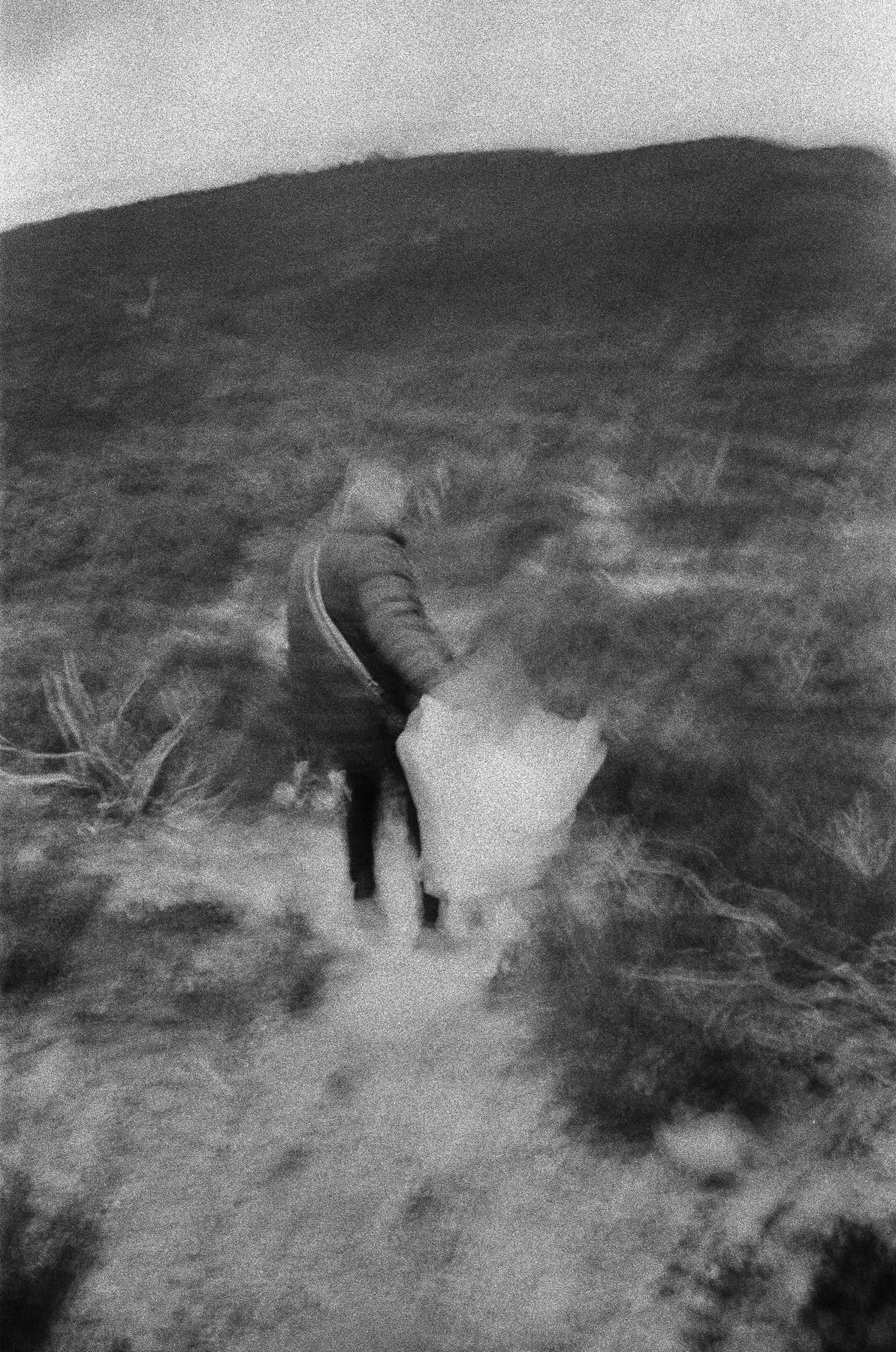
Qantas T80 seat selection reminder shortcut for Apple Shortcuts
Reading a recent Point Hacks email about the ol’ ‘T-80’ Qantas rule reminded me of an Apple Shortcuts shortcut I’d been meaning to make for a while. I’m no programmer, or Shortcut-writer, but I whipped the shortcut up today and I think it works really well.
Stealing this next image from Point Hacks, extra seats open up 80 hours out from the flight:

If you’d like a reminder about that opportunity, download the shortcut on your Apple device now. It works on Mac, iOS, and iPadOS, basically anywhere Shortcuts works.
This Shortcut looks for a calendar entry in the next year that has the letters QF in it, assumes that’s a calendar entry about a Qantas flight, and can create a reminder 80 hours before that flight to remind you that most seats that are blocked due to status are now unlocked and you’re able to select that seat if it’s not already taken.
It’s set up to look in all calendars and create a reminder in my Travel Reminders list, but you can edit it to your liking. My Qantas flights appear as part of a Tripit calendar subscription and this works fine.
Here’s how the Shortcut works:
It looks through my calendar and shows me all the calendar entries coming up that contain the letters QF, luckily for us the English language doesn’t afford us many words that use the letters q and f together, so it’s an easy selection.
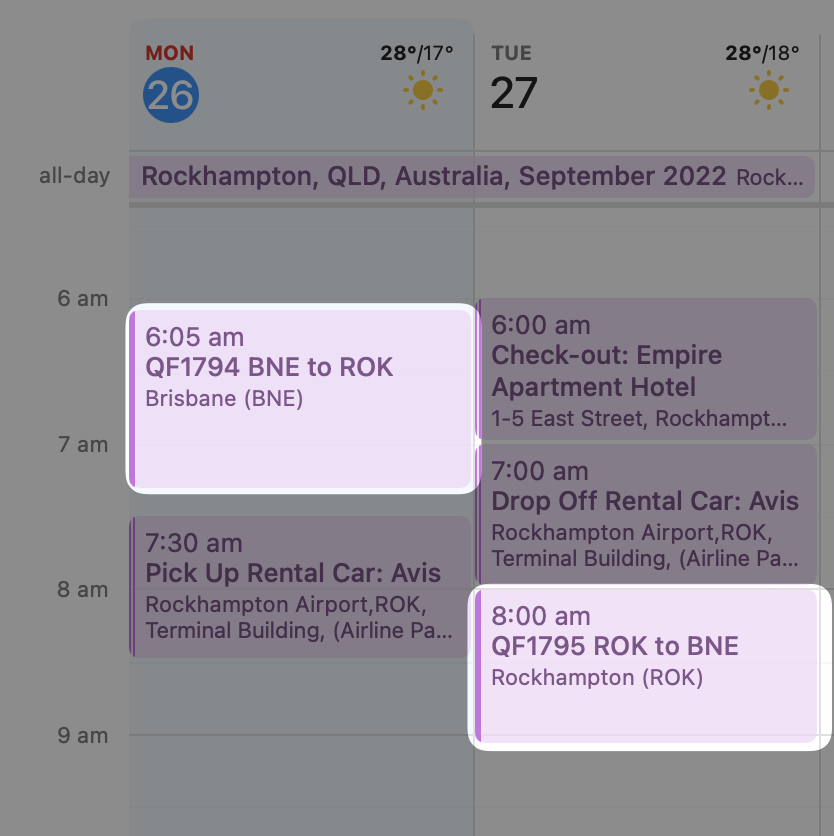
The Shortcut displays the flights, you choose one, and a reminder is created along with a link to the Qantas manage your booking page.
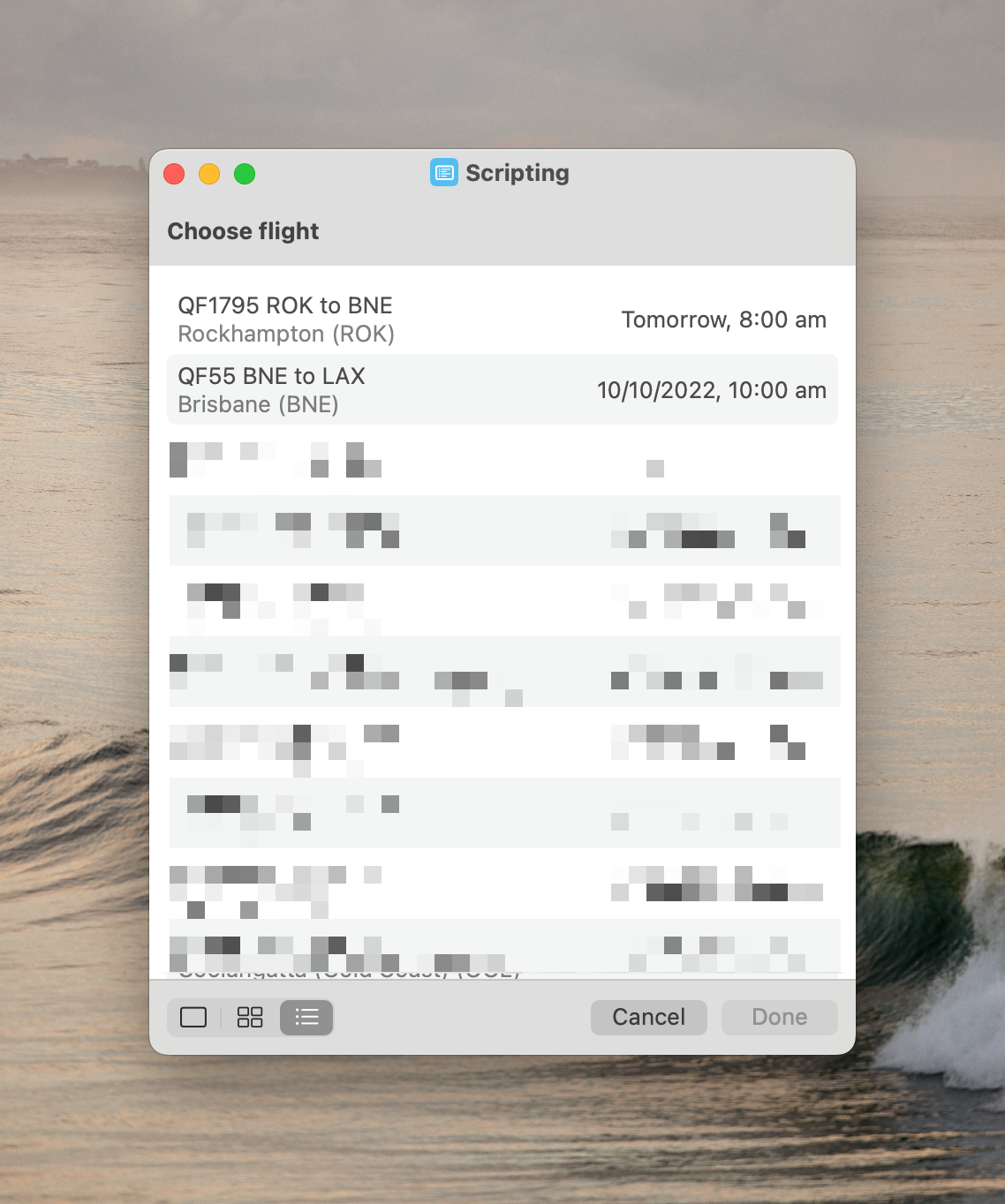
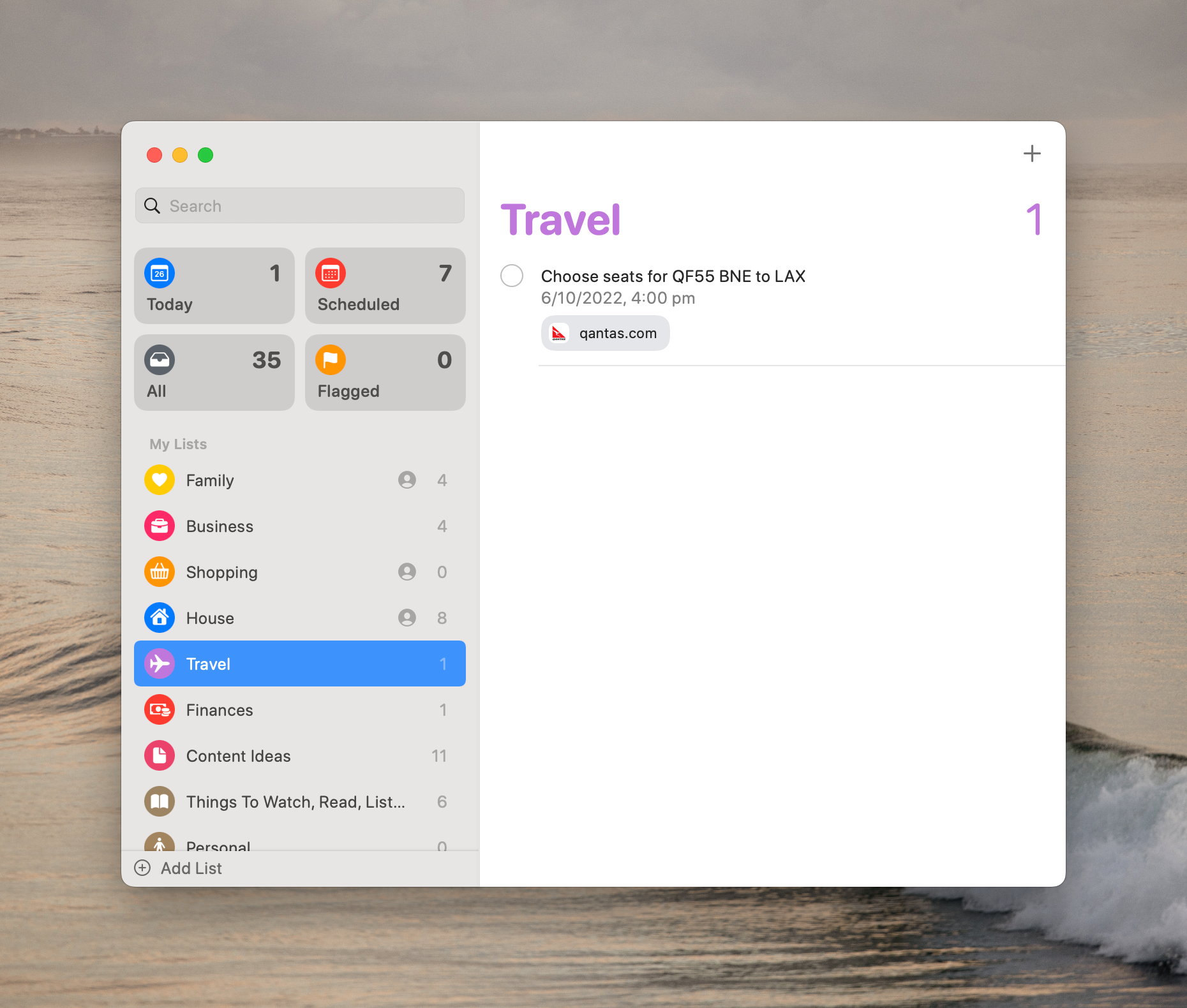
If you use a different calendar system or a to-do/reminders system, it should retrofit if your system talks to Shortcuts like most do these days.
TikTok's talking points are totally cool, nothing to see here, move along now, everything's cool ya see
It almost seems like TikTok is the great globalist company we’ve all been waiting for, to save us from the boredom of our everyday lives, and to connect us - not with our friends - but with some kind of massive data store in China that I am totally sure is totally ok and nothing to stress about at all, ya know.
TikTok’s public relations talking points via Gizmodo:
insert everything is fine gif
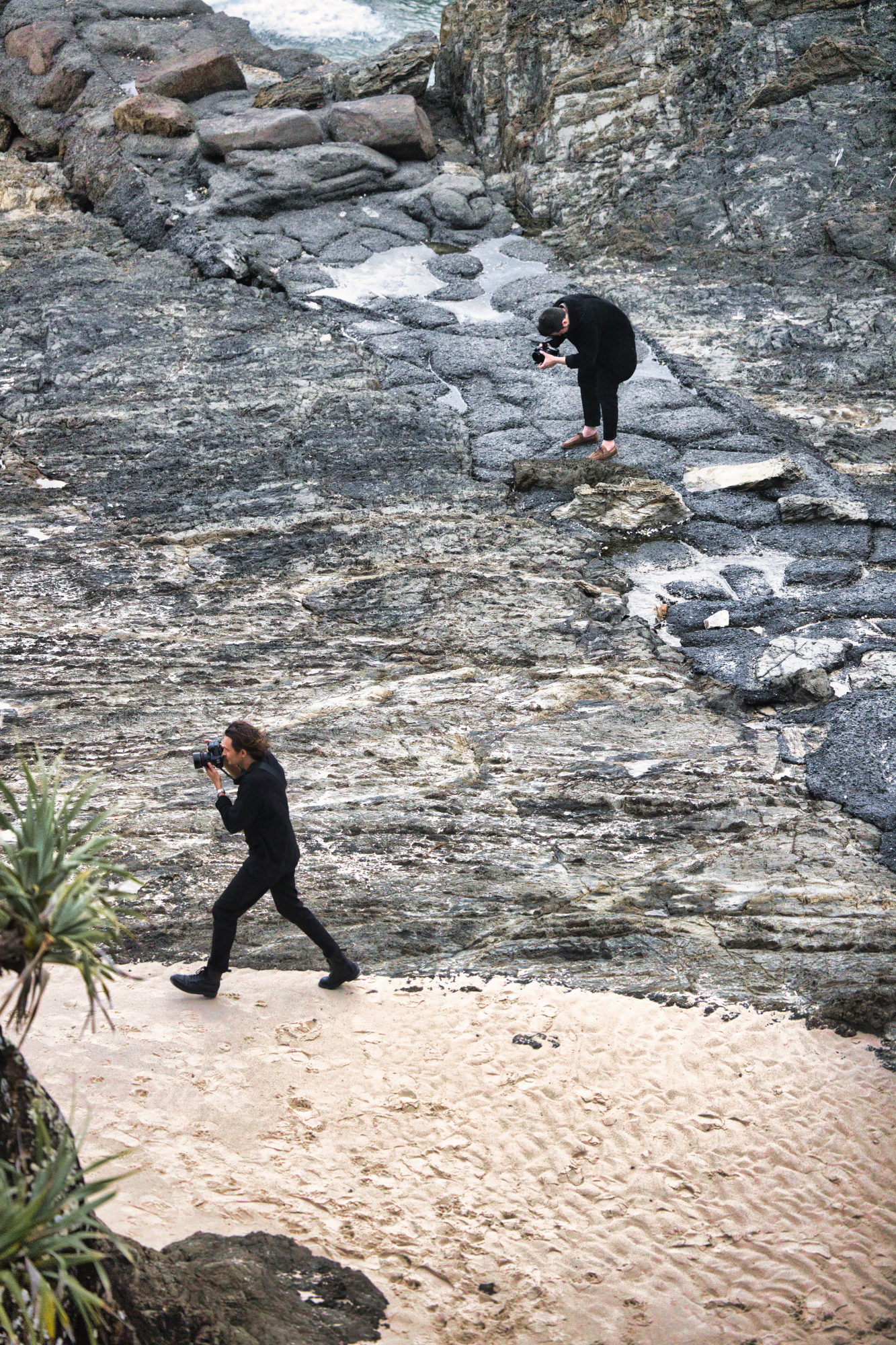
Instagram is embarrassing itself because it didn't steal, it copied
Five days after Instagram launched in October 2010 I graced the new photo-sharing service with this gold nugget.
[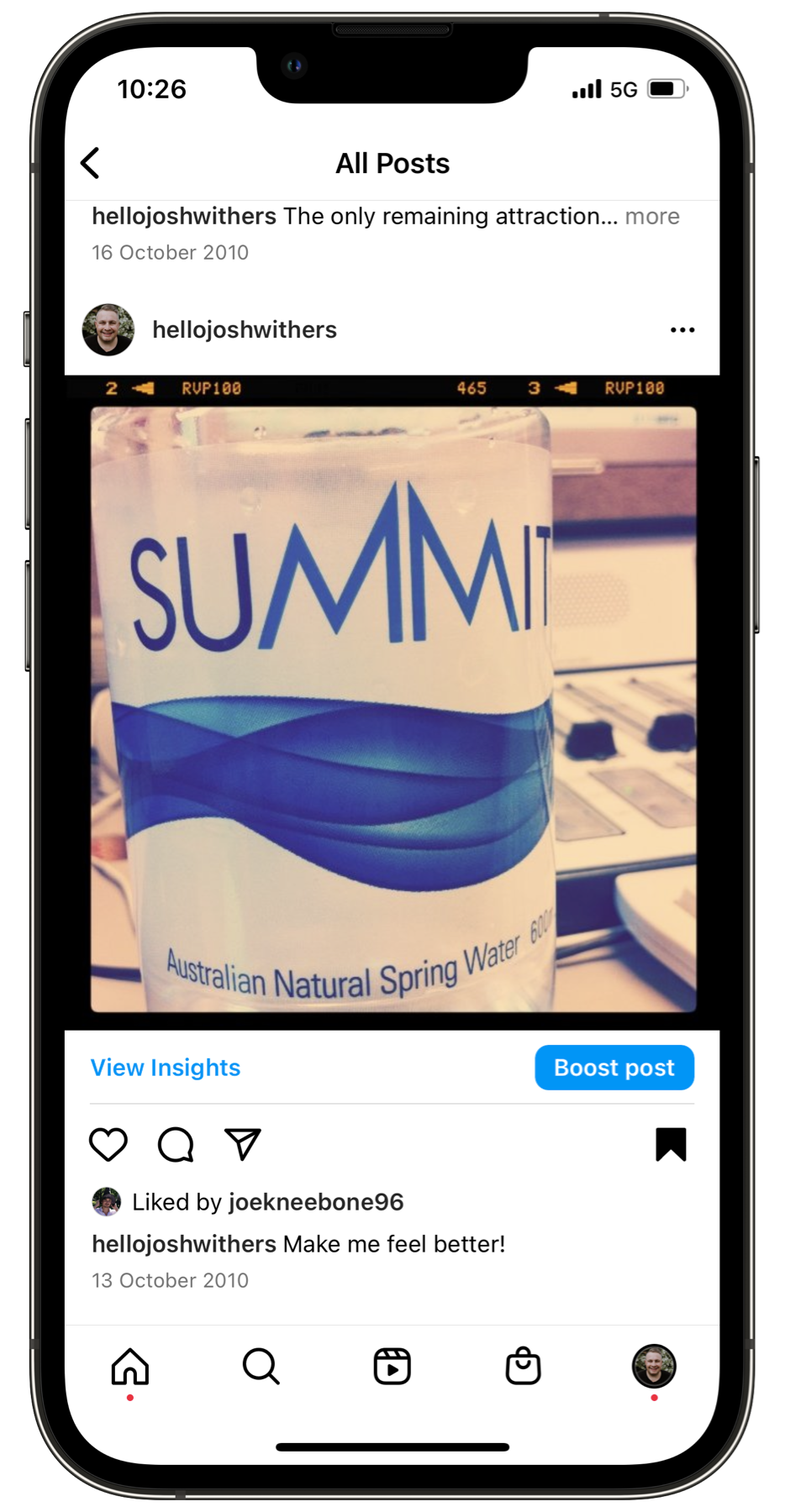 ]
(https://www.instagram.com/p/-iO/?igshid=YmMyMTA2M2Y=)
]
(https://www.instagram.com/p/-iO/?igshid=YmMyMTA2M2Y=)
4,301 days later who knew that I could have summed up the entire social network in four words.
“Make me feel better!”
Instagram made me feel better for the longest time. The simple act of making and viewing photos was lubricated to the point of a simple addiction. I could make photos and share them so easily, and you could share your photos and I could experience them so easily. We would doom scroll wanting to see more of each other’s world through the film-filtered Instagram app. Instagram, having stolen from Hipstamatic, did what the hispters never achieved - they made photo sharing easy and beautiful on our new fandangled Apple-branded telephones.
I still remember the early months of Britt and my relationship when she learned about Instagram and when she found out it wasn’t available for Android phones we bought her an iPhone. She switched to an iPhone to use a free photo-sharing app.
Making people feel better is the key to success in business, you’re solving people’s problems, making them feel better. Instagram made us feel so much better.
In the almost 12 years since, the service has adapted new features, like video, IGTV, Stories, and Reels. Each step along that path of evolution has become more and more embarrassing for it.
In 2015 when it adopted Snapchat’s Stories feature the theft was seen as an act of survival, and we generally all went along with it. After all, we wanted Stories but didn’t want to change to Snapchat and risk getting sexted by some young person along the way.
2018’s introduction of IGTV was a hedge against YouTube on mobile. Turns out that portrait/tall video was a few years too early for us.
But in the first year of the Covid pandemic when Instagram replicated TikTok’s video service as an Instagram feature called Reels, that’s when the social network started losing its soul. The desperation to kill TikTok by replicating, copying, the whole service as a feature has brought us to July 2022 when the entire app has evolved into an Instagram-shaped TikTok.
There’s a difference between stealing and copying.
Great artists steal. When an artist - I’m not sure Adam Mosseri would identify as an artist - copies, they replicate, duplicate, they make a facsimile of something else. It lacks soul, and it lacks care. Copying is not what an artist does. Copying is what a lazy corporate slave does.
Stealing, however, is key to being a great artist. If I steal from you, I take your thing and it becomes mine. I take ownership of it. I care for it. It has my attention, it has my soul. Great artists steal. They take your idea and make it their own. If Instagram stole TikTok’s video feature, it would look different to Reels. Reels wasn’t stolen from TikTok, it was copied.
The easiest way to see if Instagram stole or copied TikTok would be to open the recently updated app and see if it carries the craftsmanship of people who care. Is the user experience beautiful, is it thought through? The content being posted on Instagram as a Reel, does it have a Tiktok watermark on it or is it original content made for Instagram?
Also, what’s the deal with some parts of the app being black like a dark mode, and some being white. The recent update is just so poorly implemented.
I often wonder about what the future looks like, and the only data we have to work with is the past. Which major brands, companies, and products ceased to exist in the past - and why? Why am I typing this on a MacBook instead of a Compaq? Why is my phone an iPhone, not a Nokia? Why is my car a Mazda, not a Holden? Why is my internet connection provided by Aussie Broadband, not OzEmail?
For all the P&Ls, corporate mission statements, leadership changes, and org charts, I humbly believe that products/brands/companies that continue to exist, exist because they carry soul and bring purpose into the world, they continue to solve our problems. For all the complaints you can have about Apple Inc., there is a mountain of evidence that the individuals inside the company care about the products they ship. They might have different priorities than you or I, and what they care about might differ from what you’d like them to care about, but it is inarguable that they care.
It’s clear, without a doubt, that Meta, Mark Zuckerberg, and Adam Mosseri, do not care about Instagram. They care about eradicating - or at least neutralising - the competition and now that they can’t simply buy their competition, the goal is to strangle them out of the marketplace. Welcome to modern capitalism, and Meta is welcome to engage in it, but I’m also at liberty to comment that it’s embarrassing and I can’t help but feel that this recent copying won’t result in the goal they are shooting for.
My friend, Scotty McDonald, accused me of becoming a ratchety old man who doesn’t like change, tweeting: “I remember when you were the fearless, early adopting, shining light in my life”. I honestly hope this isn’t the beginning of my slide into the old man yells at cloud meme. But that’s why I blog, to document my eventual demise into a senile old man who might of had a few correct insights along the way.
Regardless, the July 2022 “TikTokfication” of Instagram doesn’t make me feel better, and that was Instagram’s one job.
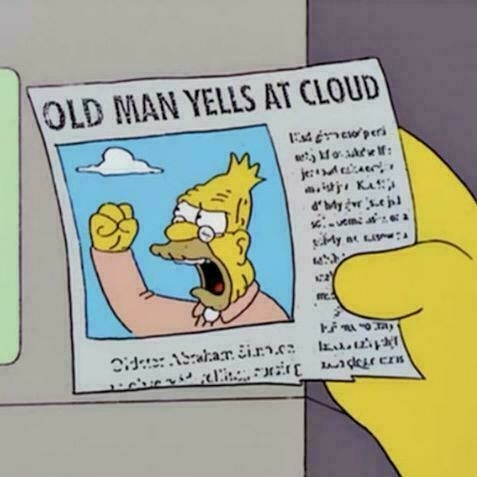
In 2022 I want to be a lot more deliberate about my inputs. Garbage in, garbage out. I’m continuing to craft my newsletters and subscriptions, detailed on my inputs page. Plus I’m now documenting books I want to read, books I am reading, and books I have read.
Small atomic changes should put make sure I’m walking down the right track.
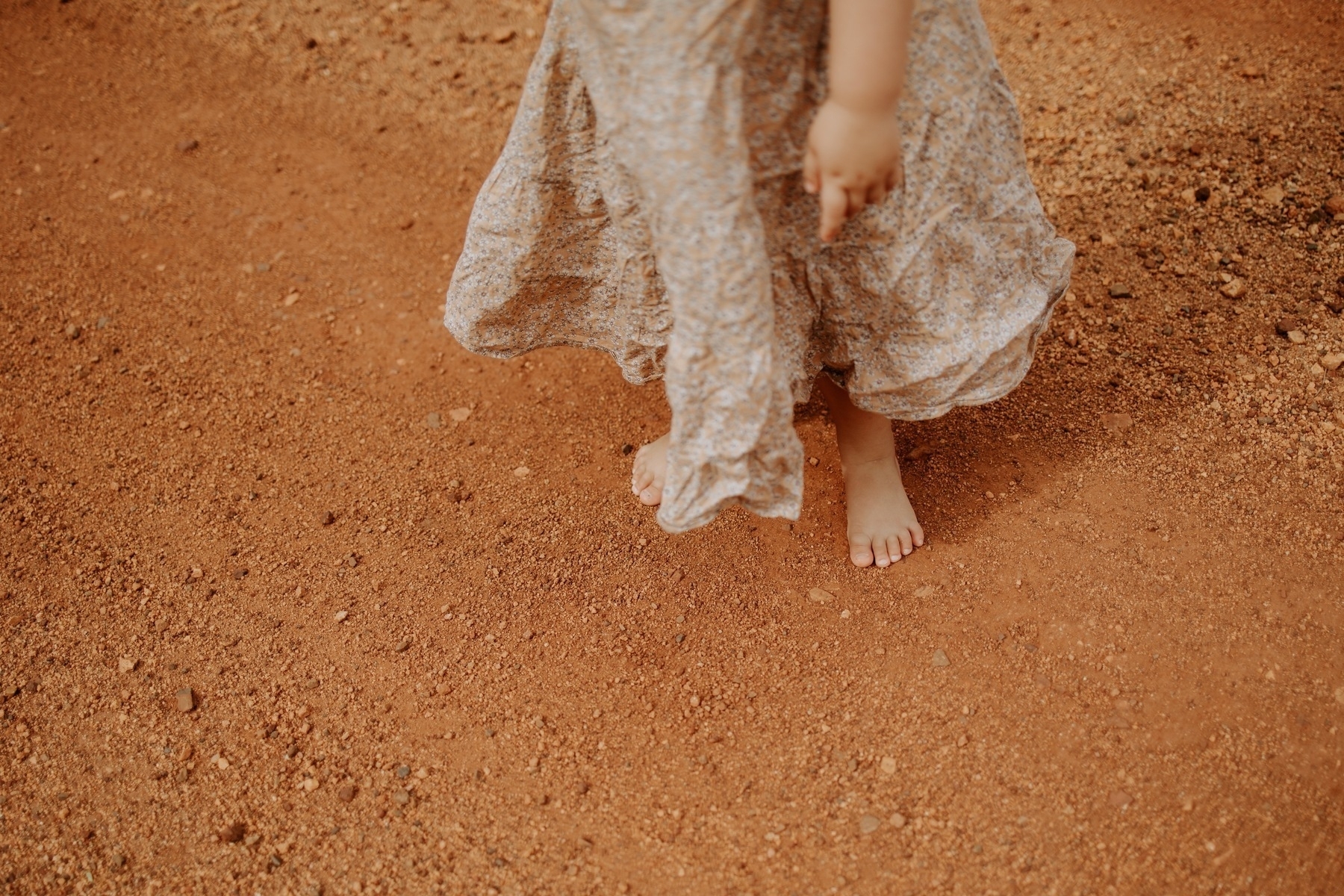
Stand back, imma fix email
Why people hate their email but also why they should love it.
I think it’s a crime that not many people subscribe to The Sizzle. The idea of paying $5 a month for it still scares lots of people away. Which is crazy, because for $5 you get immense value from the desk of @decryption. I referred my mate Nick to The Sizzle and he said “The Sizzle is one of the best things I regularly read. Can’t believe I didn’t know about it til now.” In that group chat another friend replied “Most people hate email. That’s a huge hurdle.” Which is true, but I have a theory about email.
People saying they hate email is like people that say they hate church. There’s actually nothing wrong with church as a building, an idea, the gospel as a whole is a good guide for living, it’s just that some people have majorly abused elements of church. Seriously, please stop, Christians. So should we burn church as a concept to the ground? Churches don’t kill people, people kill people. Or something like that. Should we burn email to the ground?
On the “burning email to the ground” note, a recent episode of Hemispheric Views interviewed Rob from Fastmail on the topic /cc @hemisphericviews @canion @martinfeld @burk
IMHO it’s the same with email, emails aren’t bad, but the way people use email can be bad.
I look at my mate Ash’s iPhone screen and see the red badge on his email app and it terrifies me. What’s the current unread count, Ash? The thing is, most people don’t love their inbox because it’s their internet yard … and most people don’t like looking after their own backyard.
They like going to restaurants where waiters bring the food and take away dirty dishes. We like going to public parks where the council mows the lawn. We love theme parks where the employees maintain the rides. In this analogy, Facebook, Twitter, Instagram, Apple News, LinkedIn, Snapchat, TikTok, are the third parties.
It turns out our homes & our yards are pretty cool, we just need to invest into them, maintain them, clean them, and if we do, we might enjoy living in them, and we can do whatever we like there because it’s our backyard.
Email is the backyard of the internet. Your inbox is yours, you own it, and most of us leave it to rot because it’s not on public display and most people won’t see it.
Here’s my mostly up to date list of emails I subscribe to.
Email is one of the few agnostic, device-independent, big-tech-independent, communication channels that you can easily and lovingly own. Learn to love it. Mow your internet backyard, and maybe even do some landscaping.
Tap your phone at Gold Coast bus stops to access my website
My February 2021 Apple Fitness challenge is to walk 227km in the month. So I was out late last night closing in on the target when I stopped and looked at the bus timetable sign at a local bus stop.
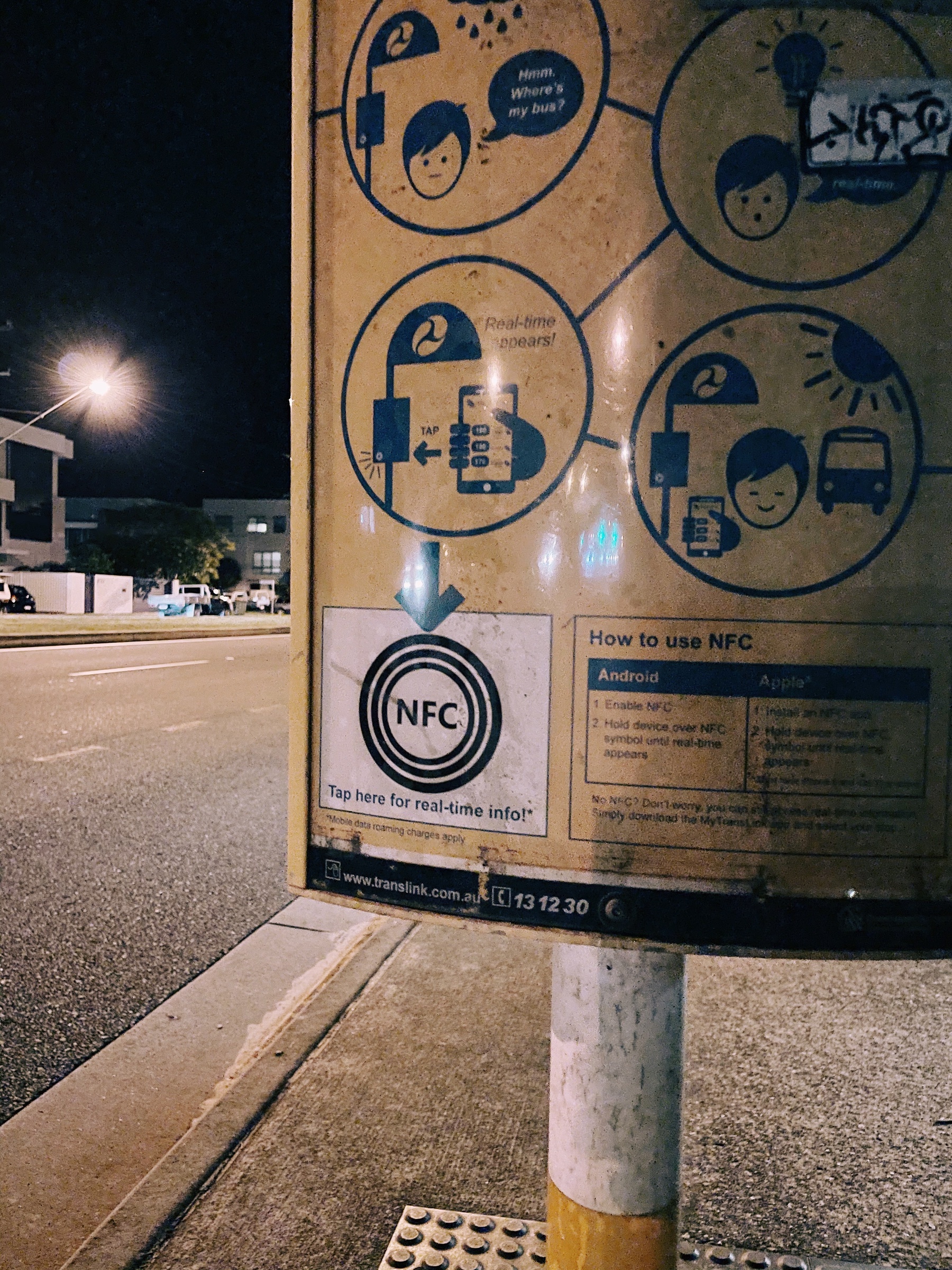
That NFC tag piqued my curiosity. I wondered if it worked on iPhone?
So I tapped my iPhone 12 Pro up against the NFC logo and a website hyperlink notification popped up like when you scan a QR code.
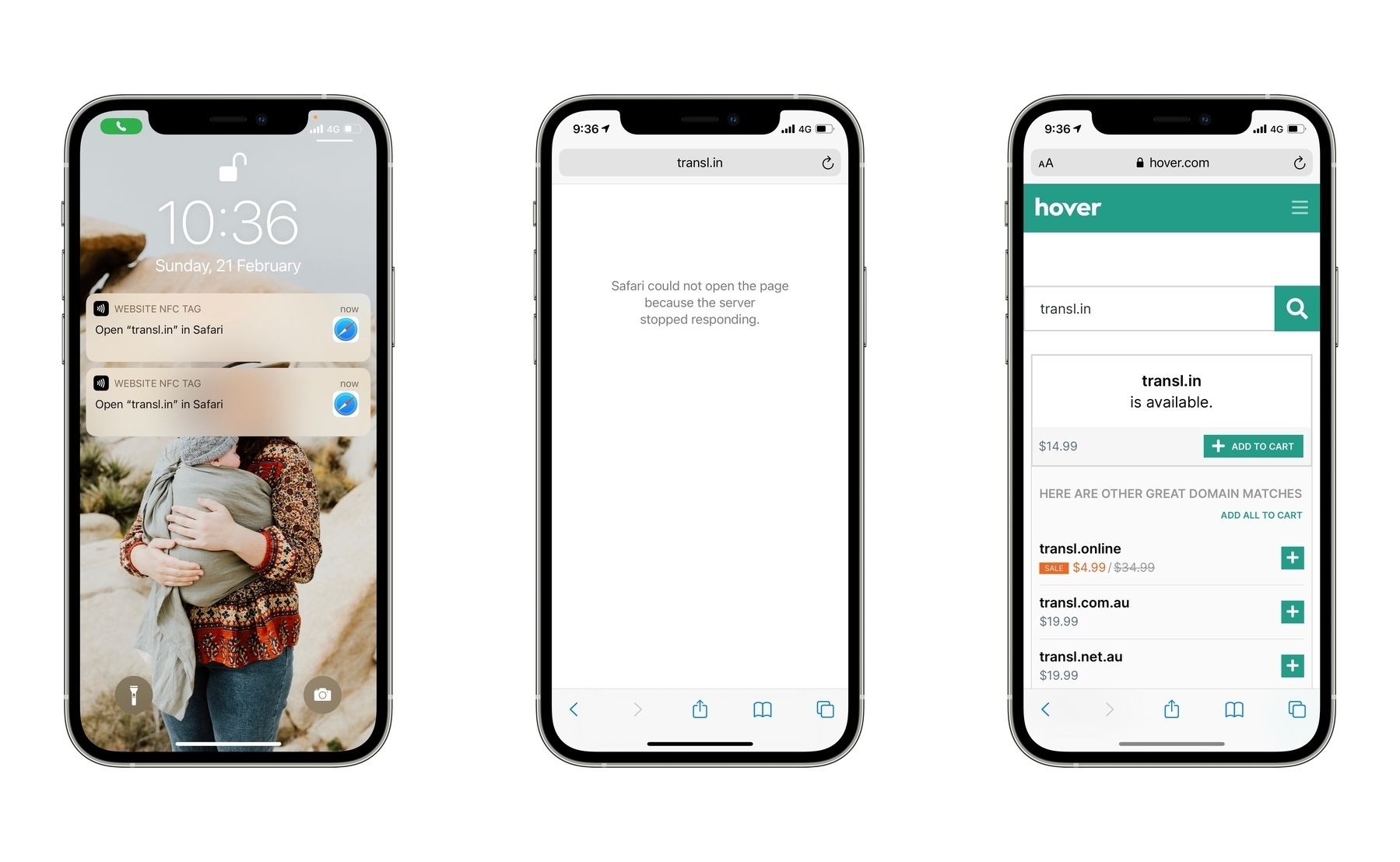
And TransLink, the local public transport provider, had neglected to renew the domain name used in the NFC tag.
I now own the transl.in domain name and the people of the Gold Coast now have easy access to my website. 🤷♂️
As an example, a local bus stop links to http://transl.in/k_300428